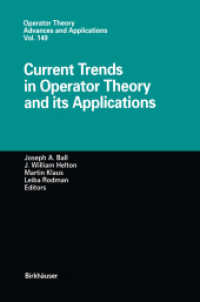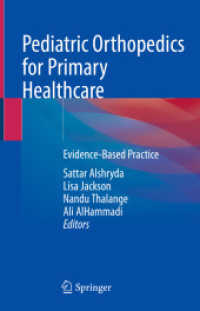- ホーム
- > 洋書
- > 英文書
- > Literary Criticism
Full Description
The Routledge Companion to Literature and Emotion shows how the "affective turn" in the humanities applies to literary studies. Deftly combining the scientific elements with the literary, the book provides a theoretical and topical introduction to reading literature and emotion.
Looking at a variety of formats, including novels, drama, film, graphic fiction, and lyric poetry, the book also includes focus on specific authors such as Shakespeare, Chaucer, Jane Austen, Virginia Woolf, and Viet Thanh Nguyen. The volume introduces the theoretical groundwork, covering such categories as affect theory, affective neuroscience, cognitive science, evolution, and history of emotions. It examines the range of emotions that play a special role in literature, including happiness, fear, aesthetic delight, empathy, and sympathy, as well as aspects of literature (style, narrative voice, and others) that bear on emotional response. Finally, it explores ethical and political concerns that are often intertwined with emotional response, including racism, colonialism, disability, ecology, gender, sexuality, and trauma.
This is a crucial guide to the ways in which new, interdisciplinary understandings of emotion and affect—in fields from neuroscience to social theory—are changing the study of literature and of the ways those new understandings are impacted by work on literature also.
Contents
Introduction. Literary Feelings: Understanding Emotions Part 1 Theoretical Perspectives 1. Affective Neuroscience: The Symbiosis of Scientific and Literary Knowledge 2. Affect Theory 3. Cognitive Linguistics: A Perspective on Emotion in Literature 4. Cognitive Science: Literary Emotions from Appraisal to Embodiment 5. Embodiment: Embodied Simulation and Emotional Engagement with Literary Characters 6. Empirical Approaches to Studying Emotion in Literature: The Case of Gender 7. Evolution: How Evolved Emotions Work in Literary Meaning 8. The History of Emotions and Literature 9. Philosophy, Literature, and Emotion Part 2 Emotions of Literature 10. Aesthetic Emotions 11. Paradoxes of Literary Emotion: Simulation and The Zhào Orphan 12. Sympathy and Empathy 13. Tragedy and Comedy: Emotional Tears and Trust in King Lear and Cymbeline Part 3 Literature and Emotion in the World 14. Colonialism and Postcolonialism 15. Disability, "Enslavement," and Slavery: Affective Historicism and Fletcher and Masssinger's A Very Woman 16. Ecology and Emotion: Feeling Narrative Environments 17. Morals: The Ethical Gangster 18. Gender, Emotion, Literature: "No Woman's Heart" in Shakespeare's Twelfth Night 19. Race and Ethnicity 20. Sexuality 21. Trauma and Its Future: Re-Visiting Aesthetic Form Debates Part 4 Elements of Literary Structure and Experience 22. Authors: Cognitive Patterns and Individual Creativity 23. Character and Emotion in Fiction 24. Language, Style, and Texture 25. Narrative and Plot: Unreliable Feelings and the Risks of Surprise 26. Readers 27. Social Reception 28. Stories: Particular Causes and Universal Genres Part 5 Modes of Literature 29. Drama: Feeling Out Loud in Shakespearean Apostrophe and the History of Emotions 30. Film: The Affective Specificity of Audiovisual Media 31. Graphic Fiction: BIPOC Teen Comics 32. Lyric 33. Prose Fiction Part 6 Literary Examples 34. Geoffrey Chaucer 35. William Shakespeare: Anxieties About Trust in The Tempest 36. Jane Austen and the Emotion of Love 37. Virginia Woolf's Development of a Sociology of Emotion in the Composition of The Years (1937)
38. Helon Habila: Structural Helplessness and the Quest for Hope in Oil on Water
39. Viet Thanh Nguyen: Navigating Anger and Empathy in The Sympathizer








